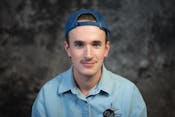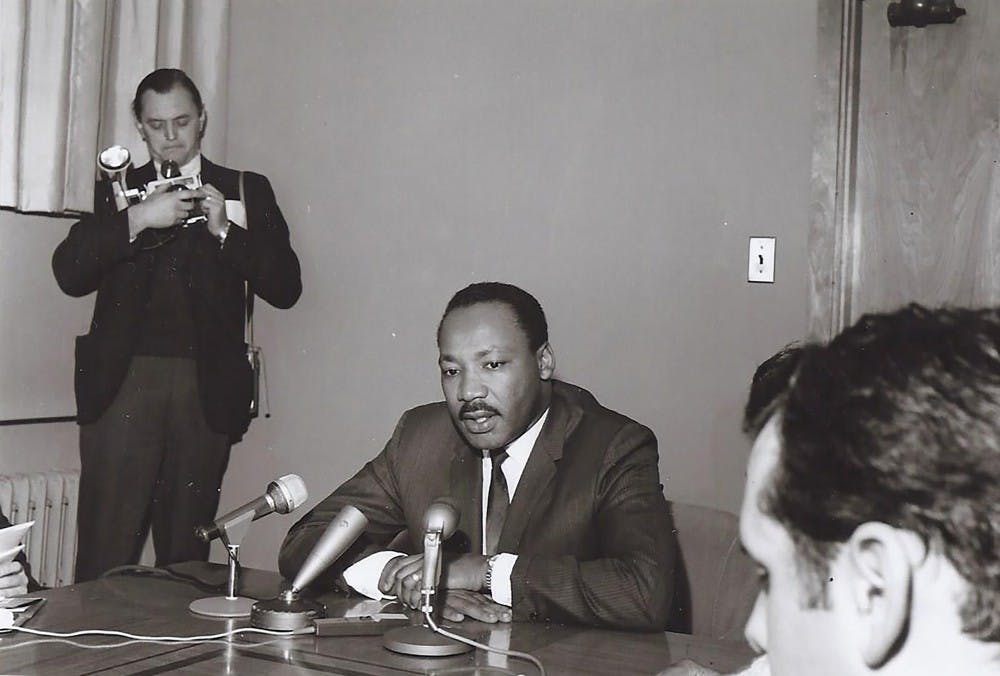UB alum Ruth Bryant still remembers the goosebumps she felt when Martin Luther King Jr. took the stage in Buffalo, 50 years ago.
Bryant, the former assistant dean of the UB School of Architecture and Planning, watched King as he walked to the podium – sensing the magnitude of the speaker just moments away from his address.
“You’re looking at this leader and knew that you were in the presence of greatness; with him talking I said ‘I got to get involved, I need to do something,’” Bryant said.
Since seeing King, Bryant has experienced a career engrained in civil service, She’s been involved with the NAACP, YWCA and United Way and is with the Community Foundation for Greater Buffalo.
“I was just so inspired and I think [the speech] is what propelled me later to become much more active in the community because that’s where change happens,” Bryant said. “But I was just awestruck.”
The reverend and celebrated civil rights leader delivered his “The Future of Integration” address to a sold-out crowd at Kleinhans Music Hall on Nov. 9, 1967. In his speech, sponsored by GSA and SA, King spoke on the status of race relations in America and briefly condemned the ongoing war in Vietnam.
In his address, King stated “we have made some significant strides over the last few decades but...we still have a long way to go...before racial justice is a reality in this country,” according to The Spectrum archives. He also shortly “castigated the ‘national administration that is more concerned with an unjust war in Vietnam than with winning the war on poverty.’”
Attendees of the speech like George K. Arthur, former president of the Buffalo Common Council, went backstage with King for a press conference regarding the address. He also accompanied the leader as he flew from Buffalo to Europe after the speech.
Arthur represented Buffalo’s Fifth Ward on the Erie County Board of Supervisors at the time. Arthur said that despite heavy pressure on King from individuals like FBI Director J. Edgar Hoover at the time, he ultimately acted as a leader for the black community.
“You could say he walked on water. Martin was the one who was able to rally people because he was an orator. If you listen to some of his speeches, he had a vision,” Arthur said. “The way of life to the black community or people of color had to change. Martin was the leader and he became a target because of that.”
During his time at UB, Norman Lazarus, emeritus professor at King’s College in London, acted as the chairman of the GSA. Lazarus’ role at UB allowed him to invite speakers to UB like Linus Pauling and Pierre Salinger, both of whom came to the university during his tenure.
His initial invitation to King, on behalf of GSA, ultimately failed but King would later arrive on another invitation in 1967. King sent a letter back to Lazarus addressing his lack of availability.
“One of the firm decisions I have made is that of spending much more time working directly with the civil rights struggle,” King wrote to Lazarus. “Please know that I deeply regret my inability to serve you. It is my hope that my schedule will soon ease up so that I can accept more of the invitations that come across my desk.”
“I was very disappointed about the King response because he was in the middle of a revolution,” Lazarus said. “It would have been terrific to have had lunch with him as I had with the other speakers.”
Things had changed drastically by 1967 – the year that preceded King’s assassination. Lazarus, working in Washington, D.C. during that year, remembers watching sections of the city burn from the roof of D.C.’s Veterans’ Hospital.
“By then civil rights were in full swing,” Lazarus said. “Why King came on the second invitation? I do not know. Perhaps the simplest explanations are best.”
At UB, students like Bryant eagerly planned out how to get to Kleinhans from her residence near Canisius College.
“Once I figured out all those logistics pieces out, I was there early,” Bryant said. “It was something that I had to go to. I must be there, because this was a person of greatness.”
Arthur noted the lack of political leaders present at Kleinhans. Many did not attend due to negative depictions of King by J. Edgar Hoover, according to Arthur.
“There were some people who avoided coming and others who didn’t want to be seen with him because of that, so a lot of the leaders of the inner city – black and white – who should have been there were not there,” Arthur said.
Bryant vividly remembers the crowd throughout the night, full of rambunctious applause and “electricity” which the “unifying” leader brought to Buffalo.
“Just by his delivery and the cadence of his word, he was more than what I saw on TV and I was transformed into another spot,” Bryant said.
The speech touched on a number of issues, from what King called the “psychological and spiritual lynching” of northern black people to a push for “inter-racial cooperation in the [black] struggle.”
“We have made some significant strides over the last few decades,” King said, according to The Spectrum. “But…we still have a long way to go ... before racial justice is a reality in this country.”
King urged for “an immediate nationwide action program” and for the eradication of poverty in the U.S., an issue of class that he thrusted into the national spotlight in his later life.
Dr. Steve Peraza, an assistant professor of history and social studies education at Buffalo State College, talked about the 1967 address on Oct. 18 at the Buffalo Academy for Visual and Performing Arts. Before his talk, Peraza analyzed King’s address with hopes of providing meaning for the present-day.
One of the things Peraza discovered in researching the speech and its context is the historical focus on King’s anti-war position.
“UB was very much interested in his anti-war position when he arrived but he spent about five minutes on it,” Peraza said. “The rest of his story was about the successes of the civil rights movements and the limitations of those successes. It was in a period of time when he was transitioning from one approach to civil rights activism – which was attack segregation, break down barriers to black voting – to a new, more radical agenda which focused on economic inequality.”
Peraza focused on the economic disparity King pointed out in his speech, a topic he thinks is pervasive to modern times. Additionally, Peraza noticed the leader’s mention of a “dangerous optimism” or the celebration of victories by advocates during the civil rights movement.
“He was warning people in Buffalo in 1967 that there had been victories but certainly not the kind of social change that would radically alter society and racism,” Peraza said. “I think today we see many of the same issues. The United States has come a long way. People aren’t forced to the back of the bus anymore or not required to drink from separate water fountains but it’s clear, especially in impoverished communities and among social justice advocates, that the civil rights gains of yesteryear need more attention.”
For attendees of the speech like Bryant, King compelled her to look into her own culture.
“Having grown up in Ellenville, a small town in the Catskills where I was the only black [person] in my high school, it was an awakening that I need to know who I am and read more about the struggle that people were going through that I had not experienced,” Bryant said.
After King’s speech, George K. Arthur continued to serve Buffalo as a politician - running for mayor of the city in 1985. Arthur thinks speeches by King and other leaders like Malcolm X, which took place in Buffalo during the ‘60s, had a major impact on voter registration in the city.
“It helped us get people to look at government and holding all the governmental officials accountable,” Arthur said. “That was something that wasn’t really being done and political parties didn’t pay much attention to the black voters, misused or used. People began to realize that they had power in their vote, they had power through the electoral process.”
Benjamin Blanchet is the senior arts editor and can be reached at benjamin.blanchet@ubspectrum.com.

Benjamin Blanchet is the senior engagement editor for The Spectrum. His words have been seen in The Buffalo News (Gusto) and The Sun newspapers of Western New York. Loves cryptoquip and double-doubles.





